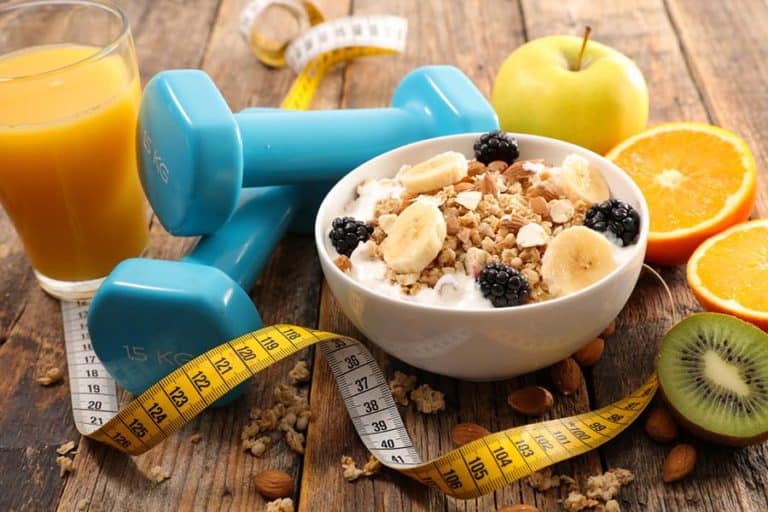Intermittent Fasting: The Secret to Celebs’ Weight Loss

It is the favorite diet regimen of most celebrities. It is the fitness trend poised to remain popular in 2022. But what do we really know about intermittent fasting? Here is a primer on all you wanted to know about this popular diet trend.
Intermittent fasting. A fancy term for something mankind has practiced since the fear of God was first institutionalized. The custom of giving up food and drink for a fixed length of time has had a long history.
From the fear of God to defying an overlord. From cleansing the soul to detoxing the body. The purpose of fasting has undergone many a transformation in its long journey through human history.
The earliest recorded references to abstaining from food and drink go as far back as the 5th century BCE. Its unrecorded practice is bound to go much further back.
Welcome to the 21st-century. Denizens of its second-decade express reverence to their bodies and to celebrity culture with a new ritual: INTERMITTENT FASTING.
Most celebrities love intermittent fasting, and millions around the world have been catching up with this trend. Alongside CBD, wearable technologies, and shrooms, this one promises to be one of the popular fitness trends of 2022.
What is intermittent fasting?
In simple terms, it is a diet regimen that involves time-bound restrictions on food consumption. The diet requires alternating between normal eating and complete fasting or low-calorie consumption.
Part of the charm of intermittent fasting is that it is far easier to practice and stick to in the longer run. Nearly [1]HARVARD T.H. CHAN: Diet Review: Intermittent Fasting for Weight Loss every other diet regimen you can imagine restricts “what you can eat”. Most diets put severe restrictions on fats, sugars, carbs, and more.
The problem with those restrictions is that our bodies do not just love and crave them, they also need them in limited quantities. Completely eliminating foods that contain fats, sugars, or carbs can lead to serious health issues in the long run. On the other hand, allowing limited consumption of such foods always carries the risk of unconscious overeating.
Intermittent fasting on the other hand only restricts “when you eat”. Instead of placing unrealistic restrictions on the contents of your plate, it restricts when and how often you can serve yourself a plate. Psychologically speaking, it is a lot easier to silence that subconscious urge to defy the rules of your diet.
While it is always a good idea to eat healthy diet, intermittent fasting does not decide what you can and cannot eat. You are free to decide what goes into your fridge, your cooking pan, or your dinner plate. The only rule you have to follow is to give your body regular long breaks from the task of breaking down the burgers, pasta, or salads you have gorged on.
Psychologically, it is easier to make your body wait a little longer before digging into a melty cheese toast. It is a lot more difficult to say “no more cheese toasts for life”. This kind of diet thus eliminates one of the biggest battles dieters have to fight: the battle with oneself.
How is intermittent fasting done?
Intermittent fasting is practiced by alternating between periods of fasting and eating. During the fasting period, dieters are only allowed to consume liquids like tea, coffee, low-calorie beverages/foods. Time-restricted dieting can be done in the following ways:
- Alternate Day Fasting: This mode of fasting involves restricting consumption for 24 hours.. For instance, you might eat normally for one whole day and follow it up with one whole day of not eating. You can go from eating a light breakfast at 8 am and then fasting up to 8 am the next day. Feel free to start at any point in the day but stick to the 24-hour window if you want to fast this way. Try to restrict your fasting day consumption to low-calorie liquids or one light meal in a whole day and see how it boosts your weight loss journey.
- 5:2 Fasting: Under this method, you divide a week into 5 days of normal eating and 2 days of fasting. On the days of fasting restrict your calorie consumption to roughly 25% of your normal calorie intake/ requirement. This comes to around 500-600 calories per day. For example, you might choose to fast on Tuesday and Thursday, while eating normally all other days of the week. On Tuesdays and Thursdays, your consumption can be restricted to only liquids, one 500 calorie meal, or 2 small 250 calorie meals per day.
- 16:8 Fasting: In this method, you have to restrict your eating to an 8-hour window each day, and fast for the remaining 16 hours. This method will require you to skip at least one meal a day. The most popular method of following this seems to be skipping breakfast. People find it easier to club the fasting period with their sleeping hours. For instance, if you sleep for 10 hours you might finish your dinner at 7 pm. You can have your next meal at 11 am the next day.
Calorie intake for intermittent fasting
The greatest charm of intermittent fasting is the apparent freedom to eat whatever you want. But, one does wonder how much calorie consumption is actually allowed in this diet regimen. Is it okay to break a 16 hour or 24 hours fast with greasy steaks with a side of fries, washed down with chilled beer?
What you eat and how much you eat will always be important. If you are aiming to lose weight, watching your calories and the source of those calories becomes even more necessary. You simply need to avoid binge eating so that you do not consume more calories than your body can burn through your fasting period.
Even if weight loss isn’t your primary goal, your diet plan should ideally include a well-balanced, nutrient-rich diet. Try not to overshoot your recommended calorie intake. Intermittent fasting can reap more benefits like fat loss than just gaining a lighter body. To experience its other benefits you will need to watch what you eat.
A good diet combined with a healthy and active lifestyle is central to any diet. Intermittent fasting is no exception to this.
Effects of intermittent fasting
Weight loss and a healthy lifestyle are among the most common goals of intermittent fasters. It is no doubt a wonderful technique to lose weight. No wonder our favorite celebrities love this diet format so much.
Everything has both effects and side effects. Like every other health and fitness trend, intermittent fasting comes with its own set of benefits and risks. Let us consider the pros and cons separately:
Health benefits of intermittent fasting
- Weight loss [2]PubMed: Intermittent fasting and weight loss: Systematic review
- Reduces obesity-related problems like breathing problems, sleep apnea, and type 2 diabetes
- Maintains blood pressure
- Develops better insulin resistance
- Improves cardiovascular/heart health
- Releases growth hormones
- Speeds up the cell regeneration process
- Scientific evidence suggests this diet might help us live longer
- Better brain health
Risks of intermittent fasting
- Persistent hunger and fatigue
- Know to increase headaches in some people [3]National Library of Medicine: Health Effects of Alternate-Day Fasting in Adults: A Systematic Review and Meta-Analysis
- Insomnia
- Causes acid reflux if not practiced carefully
- Can be dangerous for people with pre-existing diabetes, kidney and heart conditions
- Should not be tried by people with pre-existing eating disorders
- Not suitable for those who are in their active growth stage (adolescents)
Celebrities who tried intermittent fasting
This article would never be complete without a reference to celebs who intermittent fast, would it? Many of our favorite celebs who do intermittent fasting have found it effective in the maintenance of a healthy weight and a healthy lifestyle. Moreover, it is the kind of diet that doesn’t seem to put much pressure on their already demanding lifestyles.
Here’s a list of celebrities who follow intermittent fasting as their go-to diet trend.
Jack Dorsey, Co-founder of Twitter
The ex-CEO of Twitter Jack Dorsey practices daily intermittent fasting. He eats only one meal a day between 6.30-9.00 pm. This meal usually consists of a portion of protein and vegetables.
Dorsey claims that intermittent fasting, along with regular walking and hydrotherapy promotes weight loss and also keeps him healthy, and focused.
Jennifer Aniston
Jennifer Aniston is perhaps one of the most famous names among celebs who have endorsed intermittent fasting. She started out in October 2019 and says that she has “noticed a difference” in the way she felt and looked.
Her fasting method requires her to skip breakfast. She sticks to coffee and celery juice in the morning.
Chris Pratt
The Guardians of the Galaxy star went on social media encouraging people to learn about intermittent fasting and try it out. He claimed to have “lost a little weight” since trying this diet.
Pratt doesn’t eat till noon and does some cardio in the morning. The diet and the cardio does show up well on the Hollywood hunk, don’t they?
Kourtney Kardashian
There’s barely a trend or a fad that the Kardashians ever miss. Intermittent fasting is no exception to this unwritten rule. Kourtney Kardashian declared her love for this trendy diet regimen on the health and lifestyle website she founded.
Kourtney does not eat anything after 7 pm at night until 10.30 am the next morning. She has also tried the 24-hour fasting format. This has helped her in her weight loss journey.
Venessa Hudgens
Venessa Hudgens swears by the health benefits of intermittent fasting. She was introduced to it by a friend who seemed to look younger and healthier after trying time-restricted dieting. She follows the 16/8 method of fasting.
Mindy Kaling
Mindy Kaling of “The Office” fame apparently stepped on the intermittent fasting bandwagon sometime in 2018. She humorously referred to the 16/8 variant of intermittent fasting as 16 hate. The lady clearly loves her food and hates the fasts.
Scarlett Johansson
Johansson apparently fasted for 12 hours a day while preparing for her demanding role as the Black Widow. At times she pushed it to 14 or 15 hours. Her diet was combined with a grueling workout regime to keep her fit and strong.
The list may gone for the celebrities who eat 500 calories a day.
Our Take
Wrapping it up, intermittent fasting is clearly poised to stay in the health and fitness scene for some time now. With or without the celebrity endorsement it is an extremely healthy form of diet if practiced safely and sensibly.
If you plan to take up intermittent fasting make sure to do it after a little consultation with a dietician, doctor, or nutritionist. They can help you formulate a diet plan that suits your body type, health conditions, and your general lifestyle.
Conversely, they might tell you not to get into this diet if your pre-existing health conditions pose any risks. Either way, your health will be safer, and your diet more effective, if done under observation and guidance.
References
| ↑1 | HARVARD T.H. CHAN: Diet Review: Intermittent Fasting for Weight Loss |
|---|---|
| ↑2 | PubMed: Intermittent fasting and weight loss: Systematic review |
| ↑3 | National Library of Medicine: Health Effects of Alternate-Day Fasting in Adults: A Systematic Review and Meta-Analysis |







